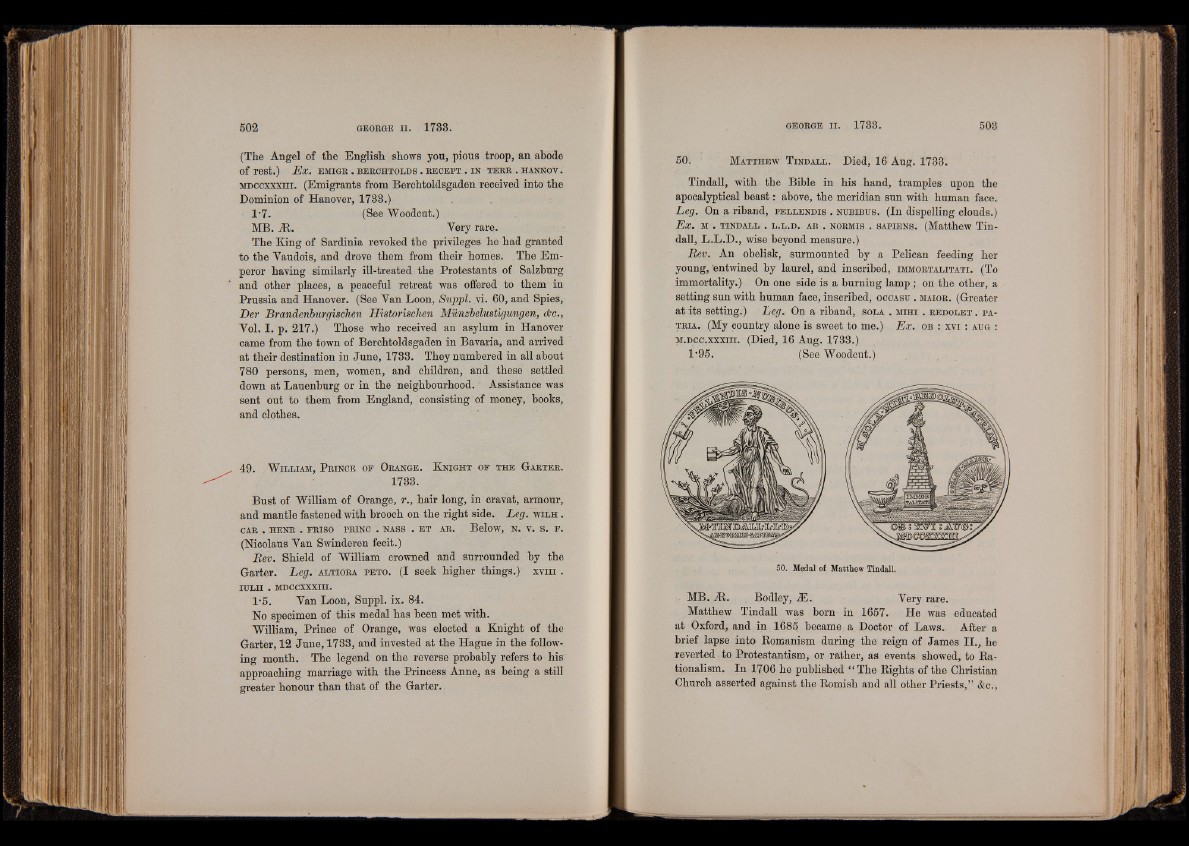
(The Angel of the English shows you, pious troop, an abode
of rest.) Ex. em ig r . b e r c h t o l d s . r e c e p t in t e r r . hannov .
MDCCxxxin. (Emigrants from Berchtoldsgaden received into the
Dominion of Hanover, 1788.)
1*7. (See Woodcut.)
MB. At. Very rare.
The King of Sardinia revoked the privileges he had granted
to the Vaudois, and drove them from their homes. The Emperor
having similarly ill-treated the Protestants of Salzburg
and other places, a peaceful retreat was offered to them in
Prussia and Hanover. (See Van Loon, Suppl. vi. 60, and Spies,
Der Brandenburgischen Historischen Miinzbelustigungen, die.,
Vol. I. p. 217.) Those who received an asylum in Hanover
came from the town of Berchtoldsgaden in Bavaria, and arrived
at their destination in June, 1733. They numbered in all about
780 persons, men, women, and children, and these settled
down at Lauenburg or in the neighbourhood. Assistance was
sent out to them from England, ^consisting of money, books,
and clothes.
49. W il l ia m , P r in c e o f Or a n g e . K n ig h t o f t h e G a r t e r .
1733.
Bust of William of Orange, r., hair long, in cravat, armour,
and mantle fastened with brooch on the right side. Leg. w il h .
CAR . HENR . FRISO PRINC . NASS . ET AR. Below, N. V. S. F .
(Nicolaus Van Swinderen fecit.)
Rev. Shield of William crowned and surrounded by the
Garter. Leg. a l t io r a p e t o . (I seek higher things.) xvm .
rcLii. m d c c x x x iii.
l -5. Van Loon, Suppl. ix. 84.
No specimen of this medal has been met with.
William, Prince of Orange, was elected a Knight of the
Garter, 12 June, 1733, and invested at the Hague in the following
month. The legend on the reverse probably refers to his
approaching marriage with the Princess Anne, as being a still
greater honour than that of the Garter.
50. M a t t h ew T in d a l l . Died, 16 Aug. 1733.
Tindall, with the Bible in his hand, tramples upon the
apocalyptical beast: above, the meridian sun with human face.
Leg. On a riband, p e l l e n d is . n u b ib u s . (In dispelling clouds.)
Ex. m . t in d a l l . l .l .d . ab . n o rm is . s a p ie n s . (Matthew Tindall,
L.L.D., wise beyond measure.)
Rev. An obelisk, surmounted by a Pelican feeding her
young, ’entwined by laurel, and inscribed, im m o r t a l it a t i. (T o
immortality.) On one side is a burning lamp; on the other, a
setting sun with human face, inscribed, occastj . m aio r . (Greater
at its setting.) Leg. On a riband, sola . m ih i . r e d o l e t . pa -
trla. (My country alone is sweet to me.) Ex. ob : xvi : adg :
m .d c c .x x x i i i . (Died, 16 Aug. 1733.)
1‘95. (See Woodcut.)
50. Medal of Matthew Tindall.
MB* Bodley, j?E. • • Very rare.
Matthew Tindall was born in 1657. He was educated
at Oxford, and in 1685 became a Doctor of Laws. After a
brief lapse into Romanism during the reign of James II., he
reverted to Protestantism, or rather, as events showed, to Rationalism.
In 1706 he published “ The Rights of the Christian
Church asserted against the Romish and all other Priests,” &c.,